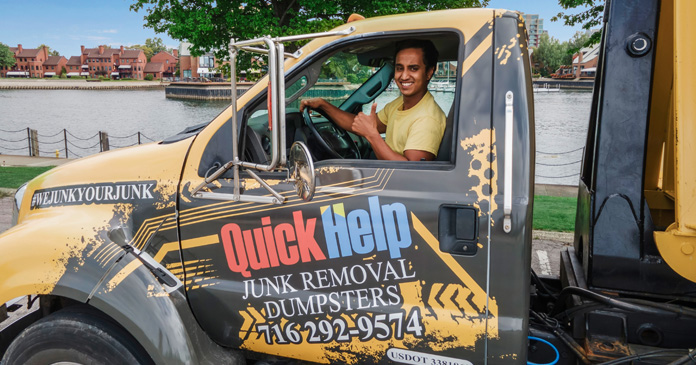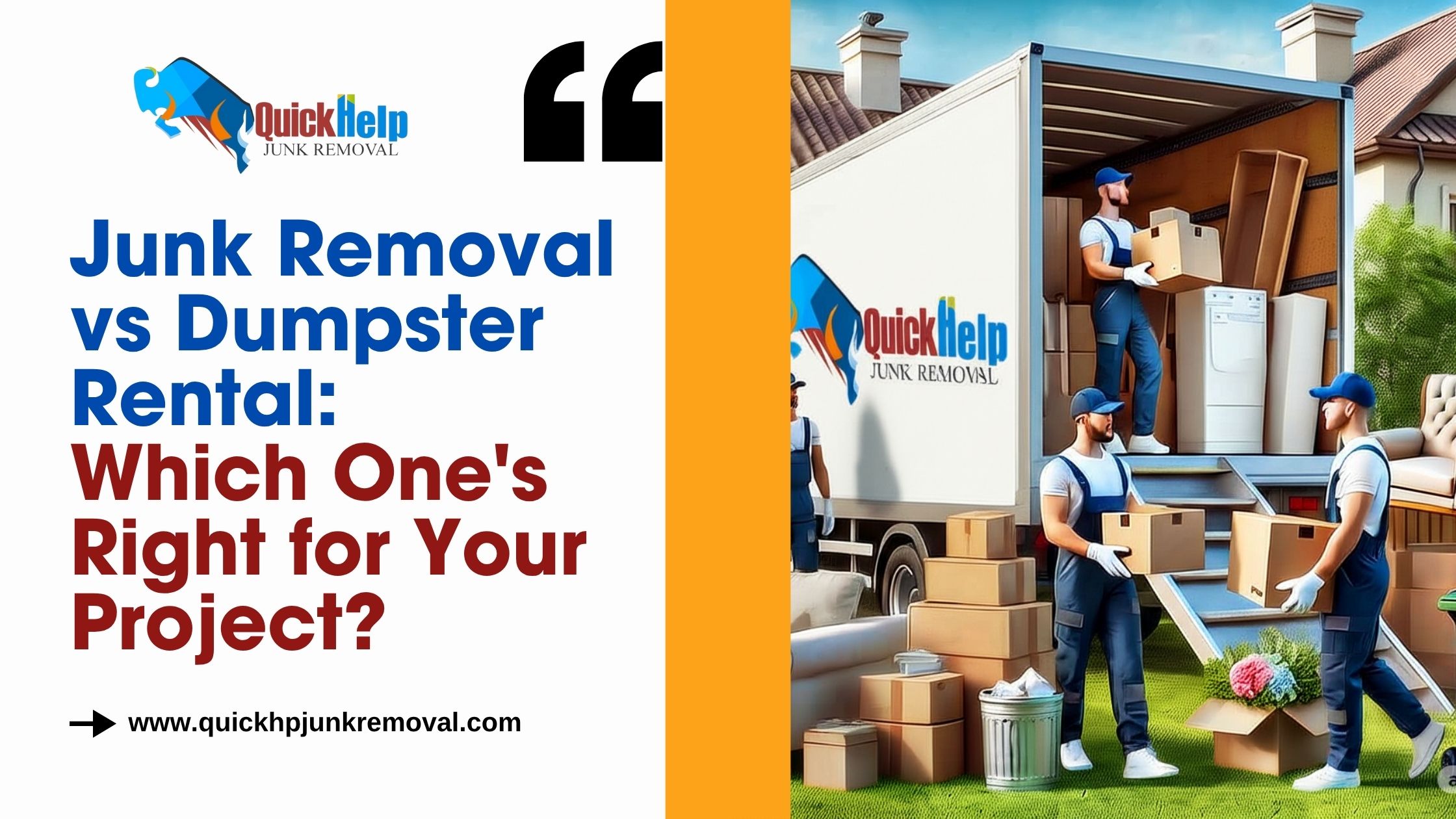Standing in your garage surrounded by boxes of old stuff, construction debris, and that broken furniture you’ve been meaning to deal with for months? You’re not alone. The average American generates about 4.5 pounds of waste per day, and when you add major cleanouts or renovation projects to the mix, that number skyrockets.
I’m about to break down the real differences between junk removal services and dumpster rentals so you can make the right choice for your specific situation. Trust me, picking the wrong option can cost you hundreds of dollars and turn your project into a nightmare.
Choosing between junk removal and dumpster rental isn’t just about price—it’s about timing, convenience, and what kind of project you’re actually dealing with. When was the last time you made a decision this important without knowing all the facts?
Let me guess: you’ve been putting off this cleanout because you’re not sure which service makes sense. That uncertainty might be exactly what’s keeping you stuck with a mess you could have handled weeks ago…
Understanding Junk Removal Services

How Junk Removal Actually Works
Picture this: you call a company, they show up at your door with a truck and a team, and they haul away whatever you point to. That’s junk removal in a nutshell.
The crew handles all the heavy lifting, navigating stairs, and figuring out how to get that oversized dresser through your narrow doorway. They’re experienced with tricky removals that would take you hours to figure out.
Most companies work on appointment-based scheduling. You book a time slot, they arrive with a truck (usually a big box truck or trailer), and their crew loads everything for you.
The whole process typically takes 1-3 hours depending on how much stuff you have.
You don’t need to sort, bag, or prepare anything. Point at the old couch, the pile of boxes in the corner, and that exercise equipment collecting dust—they’ll grab it all. You literally don’t have to lift a finger.
What Junk Removal Companies Take (and Don’t Take)
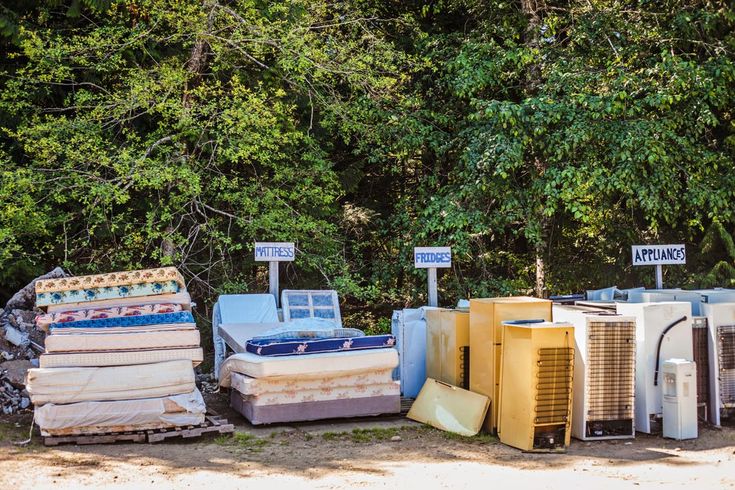
Most junk removal services are surprisingly flexible about what they’ll haul away. Furniture, appliances, electronics, boxes of household items, yard waste, and even some construction debris are typically fair game.
-
- They’ll usually take old mattresses, sofas, refrigerators, computers, and piles of random household clutter.
-
- Many companies also handle appliance disconnection and will remove items from anywhere in your house—basement, attic, garage, you name it.
But there are limits. Hazardous materials like paint, chemicals, asbestos, and medical waste are usually off-limits. Some companies won’t touch extremely heavy items like pianos or hot tubs without special arrangements and extra fees. Most services also have restrictions on construction debris. While they might take a small bathroom renovation’s worth of tiles and fixtures, they’re not equipped for major demolition waste.
Typical Pricing Structure for Junk Removal
Junk removal pricing can seem confusing because most companies quote based on volume rather than weight. They’ll typically charge based on how much space your stuff takes up in their truck.
-
- Expect to pay anywhere from $100-200 for a small load (think a few pieces of furniture) up to $400-800 for a full truck load.
-
- Most companies offer free estimates, either over the phone or in person.
-
- Labor-intensive jobs cost more. If your stuff is in a third-floor walkup or requires disassembly, that’s reflected in the price. But this labor is included—you’re not paying extra for the muscle.
-
- Many companies offer flat-rate pricing for specific items. A mattress might be $75, an old refrigerator $100, regardless of what else you’re having removed. This can make budgeting easier for smaller jobs.
Understanding Dumpster Rental Services

How Dumpster Rentals Work
Dumpster rental is essentially temporary storage that gets picked up when you’re done. You rent a container for a specific period (usually 7-14 days), they deliver it to your property, and you fill it at your own pace.
-
- The rental period starts when the dumpster is delivered, not when you start using it. So if you’re not ready to start throwing things away immediately, you’re paying for empty dumpster time.
-
- Most companies drop the dumpster in your driveway or street (with permits). You’re responsible for loading it, which means you need to be physically capable of lifting and throwing items into what’s essentially a large metal box.
-
- When you’re done, you call for pickup. Some companies allow you to extend the rental period for additional daily fees, while others strictly enforce their pickup schedules.
Dumpster Sizes and Capacity Options
Dumpster sizes are measured in cubic yards, which can be confusing if you’re not familiar with construction. Here’s what each size actually means:
-
- A 10-yard dumpster (about 12 feet long) holds roughly 3-4 pickup truck loads of debris. It’s perfect for small bathroom renovations or cleaning out a single room.
-
- A 20-yard dumpster (about 20 feet long) can handle 6-8 pickup truck loads. This size works well for kitchen renovations, large garage cleanouts, or moderate amounts of construction debris.
-
- A 30-yard dumpster (about 22 feet long) holds 10-12 pickup truck loads and is ideal for major home renovations or whole-house cleanouts.
-
- A 40-yard dumpster (about 22 feet long but taller) can hold 16-20 pickup truck loads. This is construction-grade capacity for major demolition projects.
Cost Breakdown for Dumpster Rentals
Dumpster rental pricing includes several components that aren’t always obvious upfront. The base rental fee covers delivery, pickup, and disposal of a certain weight limit (usually 2-6 tons depending on size).
-
- Typical pricing ranges from $300-500 for a 10-yard dumpster up to $500-800 for a 40-yard container. But this is just the starting point.
-
- Weight overages are where costs can spiral. Exceed the weight limit, and you’ll pay $50-100 per ton over. Construction debris is notoriously heavy, so this can add hundreds to your bill.
-
- Additional fees include permit costs if the dumpster goes on public property ($50-200), extended rental fees ($5-20 per day), and delivery charges for difficult access locations.
Project-Specific Recommendations
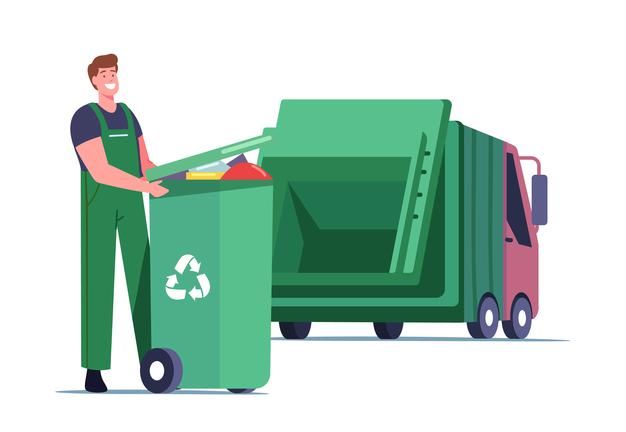
Home Decluttering and Cleanouts
For typical household cleanouts—clearing out a garage, basement, or inherited family home—junk removal usually wins hands down.
-
- Why? Most household items are bulky but not extremely heavy. Furniture, clothes, books, and random accumulated stuff fill up space quickly but won’t max out weight limits that concern dumpster rentals.
-
- Junk removal crews are experts at Tetris-like packing. They can fit way more in their truck than you’d ever manage to cram in a dumpster.
-
- Plus, they’ll go inside your house, up stairs, and into tight spaces to get items.
-
- The time factor is huge for cleanouts. A junk removal crew can clear out an entire garage in 2-3 hours. With a dumpster, you’re looking at days or weeks of work, especially if you’re doing it alone.
Renovation and Construction Projects
For major renovation projects, dumpsters often make more sense. Construction debris is heavy, dirty, and generated over weeks or months—not hours.
-
- Drywall, flooring, cabinets, and fixtures add up quickly in weight. A bathroom renovation can easily generate 2-3 tons of debris, which would be expensive for junk removal but fits perfectly in a 20-yard dumpster.
-
- You also generate debris continuously during construction. Having a dumpster on-site means you can toss materials as you remove them, keeping your work area clean and safe.
-
- The DIY factor matters too. If you’re doing the work yourself, you’re already committed to physical labor. Loading a dumpster becomes part of the project rather than an additional burden.
Estate Sales and Moving Situations
Estate cleanouts present unique challenges that usually favor junk removal services. These situations often involve valuable items mixed with genuine trash, requiring careful handling.
-
- Junk removal crews can work around items you’re keeping or selling. They’re used to selective removal—taking the broken furniture while leaving the antiques for the estate sale.
-
- Time sensitivity is crucial in estate situations. Family members often live in different cities and need the property cleared quickly. Junk removal can handle everything in one day, while a dumpster rental might extend the process unnecessarily.
-
- The emotional aspect matters too. Having professionals handle the physical removal of a lifetime’s worth of possessions can be less overwhelming than doing it yourself.
Large–Scale Landscaping Projects
Yard waste presents its own considerations. Tree removal, landscaping overhauls, and seasonal cleanups generate specific types of debris.
-
- Organic waste like branches, leaves, and grass clippings can be composted or mulched rather than sent to landfills. Many junk removal companies have relationships with composting facilities and can handle this responsibly.
-
- Heavy materials like soil, rocks, and concrete are better suited for dumpster rentals. These materials max out weight limits quickly, making junk removal prohibitively expensive.
-
- Timing matters for landscaping projects. Spring and fall cleanups happen on tight schedules driven by weather. Junk removal’s flexibility often works better than committing to a week-long dumpster rental.
Cost Analysis: When Each Option Makes Financial Sense
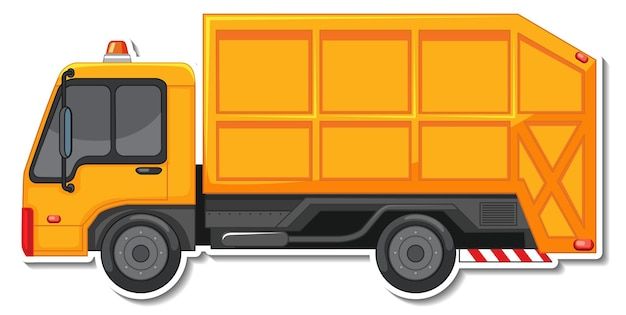
Breaking Down the True Costs
Junk removal might seem more expensive upfront, but when you factor in your time, effort, and hidden dumpster fees, the gap narrows significantly.
-
- A typical junk removal job costs $300-600 for what would fill a 20-yard dumpster. But that dumpster rental, once you add permits, potential overage fees, and extended rental charges, might cost $400-700.
-
- Don’t forget your time value. If you’re spending two full weekends loading a dumpster, that’s 16+ hours of work. At $25/hour (a reasonable value for your time), that’s $400 worth of labor you’re doing yourself.
-
- Factor in gas money for multiple trips to buy supplies, potential truck rentals if you don’t have a suitable vehicle, and the physical toll of heavy lifting. The cost difference becomes much smaller.
Hidden Costs to Consider
Dumpster rentals come with several costs that aren’t always obvious in the initial quote.
-
- Permit fees for street placement.
-
- Overage charges for exceeding weight limits.
-
- Daily fees for extended rentals.
-
- You might need to rent a truck or trailer if you’re cleaning out a location that requires transportation to the dumpster.
Junk removal’s hidden costs are usually minimal. The main one is potential additional fees for difficult access or hazardous materials, but these are typically disclosed upfront.
Volume vs. Weight Pricing Considerations
Understanding how each service prices their work is crucial for making the right choice.
-
- Junk removal typically charges by volume—how much space your stuff takes up in their truck. This pricing model favors lightweight, bulky items like furniture and mattresses.
-
- Dumpster rentals include weight limits in their pricing. Exceed those limits, and you’ll pay significant overage fees. Construction debris, appliances, and anything else that’s dense and heavy can quickly push you over these limits.
Convenience and Logistics Comparison
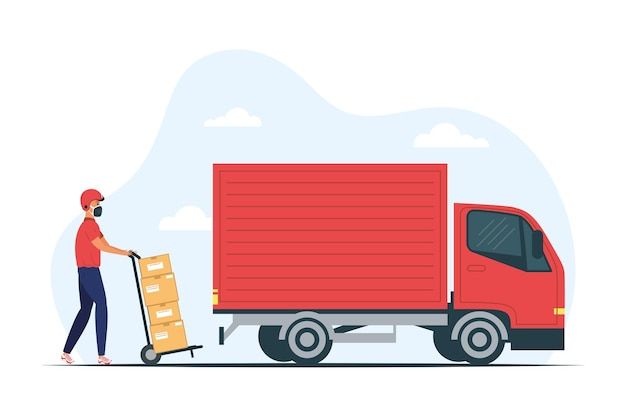
Time Investment Required
-
- Junk removal is definitively faster for the customer. You make one phone call, show up for the appointment, and everything disappears in a few hours. Total time investment: maybe 4-5 hours.
-
- Dumpster rentals require ongoing time investment. You’ll spend hours loading the container, potentially multiple trips, and coordination around the pickup schedule.
-
- The mental load is different too. With junk removal, you make one decision and it’s handled. With dumpster rentals, you’re managing the project over days or weeks.
Physical Effort and Labor Requirements
This is where the biggest difference lies.
-
- Junk removal requires zero physical effort from you. The crew does all the lifting, carrying, and loading. You literally point at items and they disappear.
-
- Dumpster rentals put all the physical work on you. You’re lifting, carrying, and throwing items into a container that might be 4-6 feet off the ground. For heavy or awkward items, this can be genuinely challenging.
-
- Consider your physical limitations honestly. If you have back problems, mobility issues, or you’re just not used to physical labor, the convenience of junk removal might be worth the extra cost.
Scheduling Flexibility
-
- Junk removal services typically offer same-day or next-day service, especially for smaller jobs. You can often get your cleanout done within 24-48 hours.
-
- Dumpster rentals require more planning. You need to schedule delivery, coordinate your availability to load it, and schedule pickup. This process typically takes a minimum of 3-5 days, often longer during busy seasons.
-
- Weather can impact dumpster rentals more significantly. Rain or snow makes loading miserable and potentially dangerous. Junk removal crews work in all weather and get the job done quickly regardless of conditions.
Making the Right Choice for Your Situation

Key Decision Factors to Consider
-
- Start with the scope of your project. Small, one-time cleanouts favor junk removal. Large, ongoing projects like renovations favor dumpster rentals.
-
- Consider your timeline. If you need everything gone immediately, junk removal is your only real option. If you have weeks to work on a project, a dumpster rental might make sense.
-
- Think about the types of materials you’re disposing of. Household items, furniture, and general clutter work well with junk removal. Construction debris, yard waste, and extremely heavy materials often require dumpster rentals.
-
- Your physical capabilities matter. If you can’t or don’t want to do the heavy lifting, junk removal is worth the extra cost for the convenience alone.
Questions to Ask Yourself Before Deciding
-
- How much control do you want over the process?
-
- What’s your comfort level with physical labor?
-
- How important is speed?
-
- Are you dealing with valuable or sentimental items?
Hybrid Approaches That Sometimes Work
Some situations call for creative combinations of both services.
-
- You might use junk removal for household items and furniture, then rent a small dumpster specifically for construction debris.
-
- Consider timing hybrid approaches carefully. Using junk removal first to clear space, then renting a dumpster for the remaining debris, can be cost-effective for large projects.
-
- Some junk removal companies offer dumpster rentals as part of their services. This can give you the convenience of one vendor while still accessing both options.
Red Flags and Common Mistakes
Warning Signs with Junk Removal Services
-
- Be wary of companies that give quotes over the phone without seeing your items.
-
- Avoid services that don’t have proper licensing and insurance.
-
- Watch out for companies that charge by the hour instead of by volume.
-
- Be suspicious of extremely low quotes.
Dumpster Rental Pitfalls to Avoid
-
- Don’t automatically choose the cheapest option.
-
- Avoid companies that won’t provide clear information about weight limits, overage fees, and accepted materials.
-
- Be careful about permit requirements.
-
- Don’t underestimate the space a dumpster takes up.
Pricing Traps and Hidden Fees
-
- Junk removal: Watch for additional fees for stairs, long carries, or difficult access that aren’t disclosed upfront.
-
- Dumpster rentals: Overage fees for exceeding weight limits and extended rental fees can significantly increase your total cost.
Environmental Considerations

Recycling and Donation Practices
-
- Many junk removal companies have relationships with recycling facilities and donation centers. They’ll sort through your items and divert usable materials from landfills.
-
- This service varies significantly. Ask about their practices before hiring.
-
- With dumpster rentals, you’re typically responsible for any recycling or donation efforts. Everything that goes in the dumpster usually goes to the landfill.
Waste Diversion Rates
-
- The best junk removal companies divert 60-80% of collected materials from landfills.
-
- Dumpster rentals typically have much lower diversion rates unless you make special efforts to separate materials.
-
- If environmental impact is important to you, research companies’ sustainability practices.
Conclusion
The choice between junk removal and dumpster rental ultimately comes down to your specific situation, timeline, and preferences.
-
- Junk removal excels when you need immediate results, want to avoid physical labor, or are dealing with household items and furniture that need careful handling. It’s the clear winner for one-time cleanouts, estate situations, and projects where convenience outweighs cost considerations.
-
- Dumpster rentals make more sense for extended projects, construction debris, or situations where you want complete control over the disposal process. They’re typically more economical for large volumes of heavy materials and work well when you have the time and physical capability to load them yourself.
Consider your project scope, timeline, budget, and physical capabilities when making your decision. Don’t forget to factor in hidden costs, your time value, and environmental considerations. Sometimes the more expensive option upfront actually saves money when you account for all the factors.
The best choice is the one that gets your project completed efficiently without exceeding your budget or causing unnecessary stress. Take the time to get quotes from both types of services, ask about their specific practices and policies, and choose the option that aligns with your priorities and capabilities.
Skip the Dumpster. Choose Smart, Stress-Free Junk Removal.
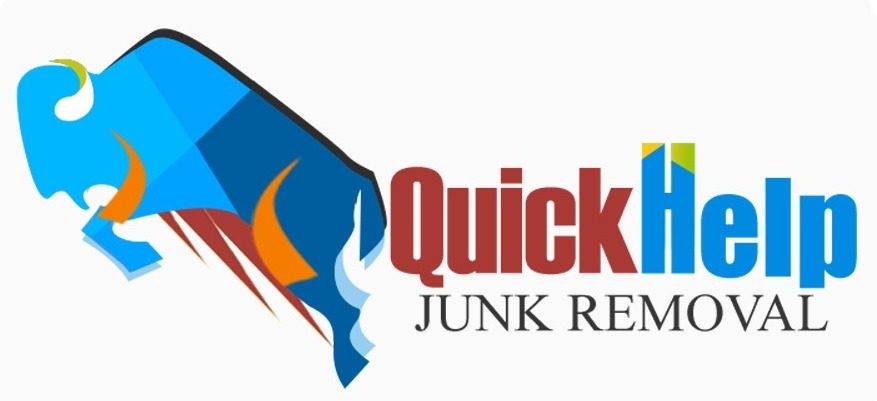
Whether you’re cleaning out your garage, clearing space before a move, or finally tackling that long-overdue renovation — don’t get buried in debris or trapped by hidden dumpster fees.
Quick Help Junk Removal makes cleanup simple across Buffalo, Tonawanda, and beyond.
We handle the heavy lifting, tight spaces, and awkward items—no dumpster, no hassle.
What We Take:
-
- Old furniture & appliances
-
- Renovation leftovers (drywall, cabinets, tiles)
-
- Yard debris, boxes, and general household junk
-
- Even tricky items from basements or attics
Why Choose Us:
-
- Volume-based pricing — not weight-based surprises
-
- Same-day or next-day pickups available
-
- Eco-friendly disposal and donation partnerships
-
- You point — we load!
Call or text us: (716) 292-9574 or (833) 784-2547
Book now: quickhpjunkremoval.com
